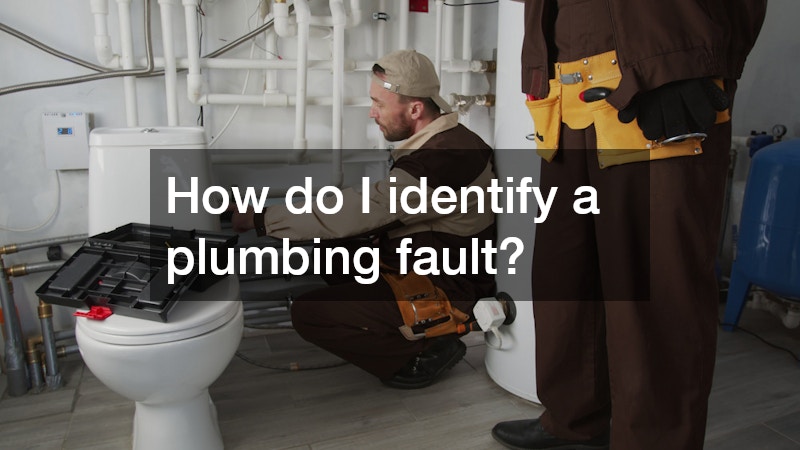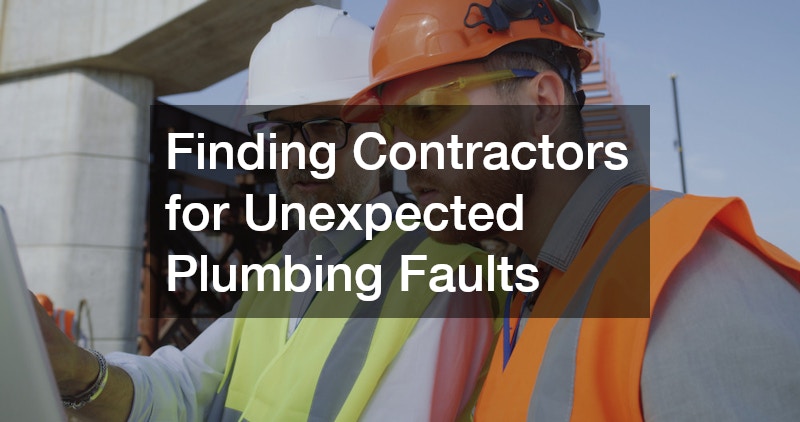
In any home or business, plumbing systems are essential yet often overlooked—until something goes wrong. When unexpected plumbing faults occur, they can cause significant disruption, water damage, and even structural issues. Finding the right contractor quickly and efficiently becomes crucial. This article explores how to identify plumbing faults, choose a qualified professional, navigate the repair process, and prepare for the future. Understanding these steps helps save time, protect property, and reduce unnecessary costs. Whether you’re facing clogged drain repairs, water heater failures, or the need for emergency response from a 24 hour plumber, being informed makes all the difference.
How do I identify a plumbing fault?

Common signs of plumbing issues
Plumbing issues often reveal themselves through subtle signs before they escalate. Common symptoms include reduced water pressure, slow drainage, strange gurgling sounds from pipes, water discoloration, or persistent moisture around fixtures. These indicators typically point to leaks, clogs, or more severe blockages developing within the system. If you’ve noticed standing water near drains or suspect a clog, contacting a drain cleaning company early on can help you avoid more significant problems.
Early detection tips
Early detection is vital in mitigating plumbing issues. Pay close attention to water bills that spike without increased usage, unusual odors near drains, or the presence of mildew in dry areas. Performing routine inspections under sinks, behind appliances, and around baseboards can help catch small leaks before they evolve into major problems. Scheduling services from a local leak detection specialist can help confirm the presence and location of hidden leaks within your walls or under your foundation.
Differentiating major vs. minor faults
Not every plumbing fault requires emergency intervention. Minor issues like a dripping faucet or a loose valve can often be managed without professional help. However, major faults such as burst pipes, sewage backup, or persistent low water pressure require immediate attention. A licensed local plumber is your best resource for accurately diagnosing whether a situation calls for urgent repair or can be addressed with standard service.
Tools for identifying leaks
Various tools can aid in pinpointing plumbing faults. Moisture meters, thermal imaging cameras, and leak detection kits are accessible and effective. Smart home water monitoring systems can alert homeowners in real time about irregular water usage or potential leaks, allowing for quicker action. For more complex diagnostics, calling a professional equipped with local leak detection tools ensures accuracy and efficiency.
When to call a professional
If you’re unable to locate the source of the problem or if DIY solutions don’t resolve the issue, it’s time to call a professional. For urgent situations such as flooding, an overflowing toilet, or a water heater that stops working, a 24 hour plumber can provide immediate assistance. Delaying professional help in serious situations can lead to compounded damages, mold growth, or structural compromise.
What should I look for in a contractor?
Licensing and certification
Always ensure a contractor holds the proper licensing and certifications required by your local government. Licensed plumbers have undergone necessary training and testing to demonstrate their knowledge and capability in handling plumbing systems safely and effectively.
Experience and specialty areas
Experience counts, especially in diagnosing complex plumbing issues. Contractors who specialize in particular areas—like sewer lines, water heater repairs, or repiping—offer targeted solutions and greater expertise. Ask how many years they’ve been in business and what types of jobs they handle most frequently. An experienced contractor will be well-versed in both residential and commercial plumbing systems.
Reviews and testimonials
Online reviews and client testimonials provide valuable insight into a contractor’s reliability, professionalism, and workmanship. Look for consistently positive feedback across multiple platforms. Red flags include unresolved complaints, lack of communication, or vague service descriptions. Be on the lookout for contractors recommended for high-demand services such as water heater services or air conditioner repairs, which often require both plumbing and HVAC expertise.
Communication and transparency
Good contractors maintain clear and open communication. They explain the scope of work, offer timelines, and answer all questions honestly. Transparency around costs, procedures, and potential obstacles reflects a contractor’s integrity and professionalism.
Insurance and warranty
Contractors should carry both liability insurance and workers’ compensation. This protects you from financial responsibility if an accident occurs on your property. Additionally, inquire about warranties on both parts and labor to ensure long-term value and peace of mind. Warranties are especially important for major services like repiping and water heater installations, where material quality and workmanship directly affect system longevity.
How do I find local plumbing contractors?

Use of online directories
Platforms like Angi, HomeAdvisor, and Thumbtack provide detailed listings of local contractors along with reviews, service offerings, and ratings. These directories often allow you to request quotes directly, helping streamline your search. Be specific in your search terms, such as “24 hour plumber near me” or “local plumber for clogged drain repairs,” to get accurate results.
Asking for recommendations
Word-of-mouth referrals remain one of the most reliable ways to find a reputable contractor. Ask neighbors, friends, family, or coworkers about their experiences. A personal endorsement often speaks louder than any online advertisement. It’s particularly useful when seeking a drain cleaning company with a proven track record or a contractor skilled in water heater repairs.
Checking social media groups and forums
Local Facebook groups, Reddit threads, and community forums frequently feature discussions about service providers. These platforms provide firsthand accounts of contractor performance, responsiveness, and pricing. They’re also a great place to search for service-specific topics like emergency plumbing, repiping specialists, or seasonal air conditioner repairs.
Visiting local business listings
Local newspapers, bulletin boards, and hardware store directories often feature trusted plumbers who serve your area. Supporting local professionals can also lead to faster response times and more personalized service. Don’t hesitate to visit physical storefronts, particularly if you’re considering long-term maintenance services.
Utilizing technology and apps
Mobile apps and smart home integrations now allow users to request plumbing services directly from their phones. Apps like TaskRabbit or Thumbtack match users with qualified professionals, simplifying the booking process and providing customer support along the way. Some apps even specialize in emergency services, helping you quickly locate a 24 hour plumber when time is critical.
What questions should I ask a potential contractor?
Work timeline and availability
Ask about the contractor’s current workload and when they can begin your repair. Knowing how long the repair will take and whether they can respond quickly during emergencies is essential for planning and minimizing disruptions. For time-sensitive needs like failed water heaters or emergency repiping, timeline clarity is essential.
Payment schedules and quotes
Understand how the contractor structures payment—whether it’s an hourly rate, flat fee, or milestone-based payment plan. Request a detailed quote in writing and clarify what the total includes to avoid surprise charges later. This is especially important for jobs with a wide cost range, such as water heater services or full-home repiping.
Experience with specific plumbing faults
Not all plumbers are equipped to handle every issue. Ask about their familiarity with your specific fault, whether it’s a burst pipe, gas line repair, or a malfunctioning water heater. Their experience with similar cases can indicate a smoother repair process and fewer surprises.
Troubleshooting and repair methods
Inquire about how they plan to diagnose and fix the problem. Professionals should be able to describe the process clearly, including what tools or technology they’ll use and how they will prevent recurrence of the issue. Ask about their approach to long-term fixes versus temporary solutions.
Follow-up and maintenance services
A quality contractor often provides follow-up inspections or maintenance packages. Ask if they offer service guarantees, annual checkups, or support in the event the issue returns. For systems like water heaters and air conditioning units, regular service is key to extending their lifespan.
How do I compare quotes and project costs?

Understanding itemized estimates
An itemized estimate breaks down the total cost into parts, labor, and miscellaneous charges. This format allows you to see exactly what you’re paying for and assess whether the quote is fair and transparent.
Comparing labor vs. materials costs
Not all high quotes are overpriced—some may reflect higher quality materials or more complex labor. Compare multiple estimates side by side, paying attention to how costs are distributed. For example, high-quality materials used in repiping or water heater installation often come with a higher initial price but longer-lasting performance.
Assessing emergency repair premiums
Urgent calls often incur additional charges. If you’re comparing emergency rates, make sure to ask about base call-out fees, hourly surcharges, and weekend or holiday pricing. This is especially relevant when you need a 24 hour plumber during off-hours.
Evaluating cost-to-value benefit
Don’t automatically choose the cheapest option. Consider the long-term value offered by a more experienced contractor who uses durable materials or provides extended warranties. A slightly higher upfront investment in a drain cleaning company or water heater service can save you recurring expenses over time.
Negotiation tips
Polite, well-informed negotiation can help reduce costs. Discuss possible cost-saving options such as reusing certain materials or scheduling work during non-peak hours. A good contractor will be willing to work within your budget where possible, particularly if you’re bundling services like plumbing and air conditioner repairs.
What should I expect during the repair process?
Pre-repair assessments
Before work begins, expect a detailed inspection and diagnosis. The contractor should walk you through their findings, explain the root of the issue, and discuss repair options. This step is essential for more complicated systems such as water heaters or home-wide repiping.
Steps in a typical plumbing repair
The repair may involve shutting off the main water line, removing damaged sections, replacing or resealing pipes, and testing the system afterward. Cleanup and site restoration should be included in the service.
Common challenges and delays
Unforeseen issues like corroded pipes, difficult access, or outdated systems can extend the repair timeline. Your contractor should keep you informed and adjust the plan as needed. Complex services like repiping or water heater replacement often uncover hidden faults once work begins.
Final inspection and walkthrough
Once the work is done, insist on a final walkthrough. This allows you to confirm that everything is functioning correctly and ask questions before signing off on the job.
Ensuring quality work
Look for clean, professional workmanship, functioning systems, and proper documentation. Don’t hesitate to request photos of the repair or additional testing to verify that the problem is fully resolved. High-quality contractors will stand behind their work, whether it’s a clogged drain repair or a full-scale water heater installation.
How can I prevent future plumbing faults?
Regular maintenance checks
Schedule periodic inspections to catch issues early. Many contractors offer maintenance plans that include seasonal checks, pressure tests, and preventative cleaning. Keeping your water heaters and air conditioning systems maintained ensures consistent performance and fewer surprises.
DIY vs. professional maintenance
Some upkeep, like unclogging minor drains or tightening loose fixtures, can be handled yourself. However, for more complex systems like sump pumps, repiping, or water heaters, leave maintenance to the pros.
Installing preventive devices
Consider installing devices such as leak detectors, pressure regulators, and backflow preventers. These can alert you to problems early or prevent damage altogether. They’re especially useful in homes with older infrastructure prone to leaks.
Recognizing high-risk areas
Pay special attention to high-risk zones such as basements, under kitchen sinks, and near older fixtures. These areas often host undetected leaks or wear and tear. Catching issues early here can prevent the need for a 24 hour plumber call later on.
Educating household members
Make sure everyone in the household knows basic plumbing care. This includes not flushing inappropriate items, recognizing signs of a leak, and knowing how to shut off the main valve in emergencies.
What are common plumbing emergencies?

Burst pipes and immediate actions
A burst pipe can quickly flood a home. Shut off the main water supply immediately and contact a plumber. Knowing your shutoff valve’s location can prevent extensive damage and simplify the repair process.
Severe clogging and back-ups
Backed-up sinks or toilets can create unhygienic and unpleasant situations. If plunging doesn’t resolve the issue, professional clogged drain repairs or hydro-jetting may be necessary.
Water heater failures
Lack of hot water or strange noises from the heater can signal a serious problem. Prompt water heater repairs ensure comfort and avoid further issues like leaks or pressure buildup.
Sewage overflow issues
Sewage backups are dangerous and require urgent attention. These events often signal a failure in the sewer line or main drain and can pose serious health hazards if untreated.
Emergency shut-off procedures
Everyone in the household should know how to shut off the main water line and isolate specific valves for sinks, toilets, and washing machines. This knowledge is crucial during a crisis and can minimize damage until a 24 hour plumber arrives.
How do plumbing warranties work?
Understanding different coverage levels
Plumbing warranties vary in scope. Some cover only the labor, others only the parts, and some both. Understand what is included and for how long before agreeing to terms. This is especially important when investing in major services like repiping or water heater installations.
Inclusions and exclusions
Always read the fine print. Common exclusions include damage due to negligence, wear and tear, or improper installation. Ask questions if anything is unclear.
Filing warranty claims
If an issue arises within the warranty period, contact the contractor promptly. Provide documentation such as invoices and service reports to facilitate the claim.
Transferring warranties
Some warranties are transferable to new homeowners, which can add value to your property. Clarify whether the warranty remains valid after a change in ownership.
Role of insurance
Homeowner’s insurance may cover certain plumbing emergencies, particularly if they cause water damage. Coordinate between your contractor and insurer for comprehensive coverage.
How does a plumber’s experience impact quality?
Benefits of hiring experienced plumbers
Experienced plumbers bring problem-solving skills, familiarity with various systems, and confidence in their repairs. Their insight often leads to quicker, more effective solutions.
Risks of hiring unqualified workers
Inexperienced or unlicensed workers can misdiagnose issues or perform substandard repairs. This increases the risk of recurring problems and additional expenses.
Experience with specific plumbing systems
Older homes and commercial buildings often contain outdated plumbing. Plumbers with knowledge of older systems or new technologies are better equipped to handle specialized challenges, especially when dealing with water heaters or HVAC-integrated systems.
Long-term repair effectiveness
Experienced contractors use proper materials and techniques that ensure repairs last. This reduces the need for repeat visits and gives homeowners greater peace of mind.
Investment vs. quick fixes
While experienced professionals may charge more initially, their work tends to provide better value. Investing in quality repairs now often prevents higher costs in the future.
Closing Thoughts
Plumbing faults can disrupt your life in an instant. By knowing how to identify issues early, choosing the right contractor, and preparing for emergencies, you gain control over a stressful situation. Understanding warranties, comparing quotes carefully, and focusing on experience over cost ensures your home remains safe and functional. Preventative care, regular maintenance, and informed choices turn plumbing problems from crises into manageable repairs. Whether you’re dealing with clogged drain repairs, emergency leaks, or full-scale water heater services, working with a reliable local plumber ensures lasting peace of mind
